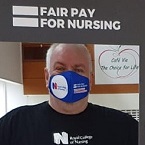Our District Nurse members have been saying for years that they are stressed, overworked, and have had increased sickness from colleagues. I took these issues to management, and they denied there was an issue, and it was only individual cases and not systemic among the directorate. This was very frustrating that they were not listening to members' concerns. So, I contacted other union colleagues, to see if they had a similar issue. They had. And as a result, our combined staff side devised a Stress Risk Assessment questionnaire based on the HSE Management Standards Indicator Tool, and with consent from managers, we sent the questionnaire to every district nurse. We received 159 responses in the two weeks we had the survey open. I felt encouraged at the response rate that this would validate our concerns.
Following the survey, we met with management and HR to discuss the findings and set up a Stress Survey work group led by the assistant director of the service to look at the themes and plan how we could work collaboratively to address the issues. After several meetings and actions, several Task and Finish groups were formed to look at specific areas of concern such as breaks, communication, allocation of work. The recommendations of these groups fed back into the Stress Work Group.
Along with this work, a Wellbeing Steering Group, chaired by the Director of HR and OD, was instigated. We shared the feedback and findings of the Stress Working Group with the Wellbeing Steering Group, so they had oversight of work being tasked to ensure there was good governance and reporting. Some of the work would have wider implications for the Trust, such as developing Stress Risk Assessment tools that could be modified for each individual Ward, Team or Service.
There was a lot of input from the Health & Safety Risk Committee to help develop the risk assessments and their input was invaluable to help focus the discussion. I was confident that with the Health and Safety Team onboard, we would be able to deliver protocols that would support our members.
For me one of the most difficult and frustrating tasks to accomplish was getting directorate management on board with the issue. After discussion with the Chief Operating Officer and the Chief Nurse, we got traction on developing a change strategy.
I linked into any of the work streams, the RCN Nursing Workforce Standards as a baseline to work from, and we have achieved some positive results. I have not always agreed with management on the way forward, and have robustly challenged them on occasions, but I have continued to work in partnership to facilitate change. You can see a sense of change in the District Nurse teams, we’ve created a feeling of being able to challenge where something is wrong. In my eyes that is a big win. You should never be afraid to raise concerns, that is how you, our members, can effect change.
If you would like to know more and are attending RCN Congress in Newport in June. Why not come along to the Fringe Event on “Work-related stress: moving beyond tokenism and buzzwords to real systematic change.”


 Share on LinkedIn
Share on LinkedIn




